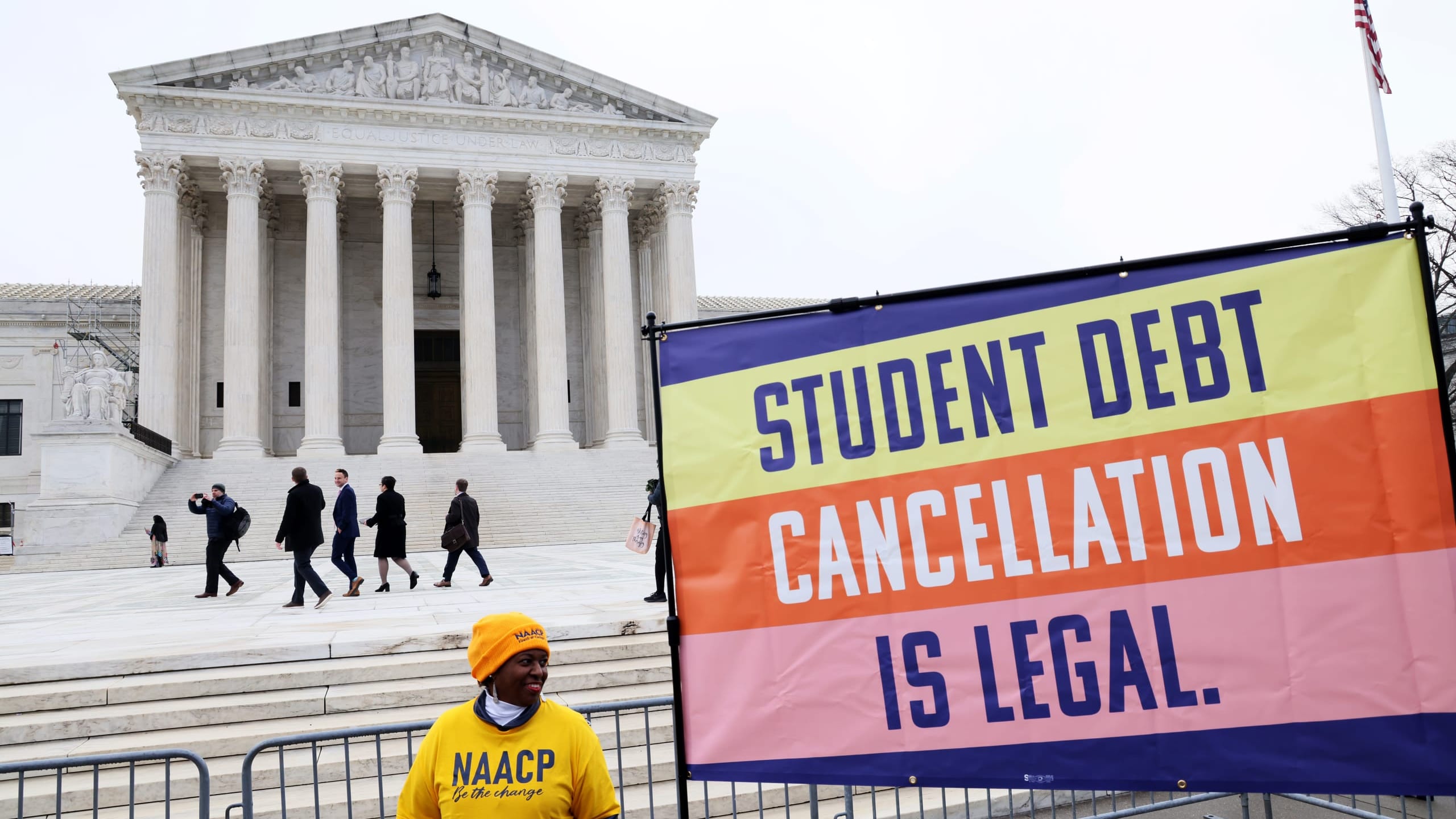We bring news that matters to your inbox, to help you stay informed and entertained.
Terms of Use and Privacy Policy Agreement
WELCOME TO THE FAMILY! Please check your email for confirmation from us.
“What you’re saying is now we’re going to give judges the right to decide how much aid to give them instead of the person with the expertise and the experience,” said Justice Sonia Sotomayor during Tuesday’s oral arguments.
The Supreme Court heard oral arguments in two unprecedented cases – Biden v. Nebraska and Department of Education v. Brown – to determine whether President Joe Biden’s student loan debt relief program would prevail.
This comes months after The United States Court of Appeals for the Eighth Circuit issued an injunction halting forgiveness nationwide, leaving many borrowers in limbo about what will happen with their student loans.
In August 2022, Biden announced a plan to eliminate up to $20,000 in federal student debt for borrowers who received a Pell Grant and up to $10,000 for borrowers who did not receive the grant to help citizens combat financial hardship during the COVID-19 pandemic. To qualify, an individual has to make less than $125,000 or the total household income must be less than $250,000, as theGrio previously reported.
During Tuesday’s oral arguments, Justice Sonia Sotomayor condemned the six GOP lead states for putting the fate of millions of borrowers in the hands of the Supreme Court’s nine justices.
Sotomayor noted that while “50 million students will benefit” from Biden’s student loan forgiveness plan, the injunction means that “they are going to continue to suffer from this pandemic in a way that the general population doesn’t.”
She added, “What you’re saying is now we’re going to give judges the right to decide how much aid to give them instead of the person with the expertise and the experience – the secretary of education – who’s been dealing with educational issues and the problems surrounding student loans.”
In the Biden v Nebraska case, states contend that their economies will be greatly impacted by the student debt forgiveness program.
Nebraska Solicitor General James A. Campbell, one of the attorneys representing the states, called the student loan debt forgiveness program “unlawful” and alleged that “no statute authorized” Education Secretary Miguel Cardona to create it.
He added that Cardona’s actions were “unprecedented” and that the HEROES Act, which grants the secretary authority to waiver or modify a statute governing the federal student financial aid programs in the wake of a disaster or emergency, has never been used to eliminate student debt before.
Sotomayor challenged Campbell’s statement and said Congress anticipated that the HEROES Act would be used for debt cancellation.
“Why would you think that Congress didn’t intend under the HEROES Act to permit cancellations of debt if a national emergency required it,” she asked.
Campbell asserted that the states would suffer financial injury due to Biden’s initiative; however, Justice Ketanji Brown Jackson disagreed. The newest justice told the attorney that he did not present sufficient evidence to support that claim.
On the contrary, the government asserts that these states lack standing because they have not presented a case in which they have suffered harm.
U.S. Solicitor General Elizabeth B. Prelogar, the attorney who represents the federal government, asked the court to “reject the states’ arguments.”
She also stated that Cardona “acted within his authority” under the HEROES Act when he proposed a plan to eliminate student debt for eligible borrowers amid the COVID-19 pandemic and that Congress authorized his plan because it was “deemed essential.”
The attorney also claimed that the states’ would not suffer financial harm from the government’s actions.
However, the conservative justices were not entirely convinced that the Biden-Harris administration had justified invoking the HEROES ACT to create a loan forgiveness plan for borrowers.
Justice Brett Kavanaugh pushed back while speaking with Prelogar and was skeptical that the language in the HEROES Act authorized Cardona to eliminate student debt for some borrowers.
“So, that leaves us with a situation that I think we’ve seen before – an old statute with kind of general language – Congress specifically considering the present issue repeatedly but not, as you acknowledge,” he said.
He added the Biden administration created “a massive new program” that was not permitted under the HEROES Act.
Birmingham Mayor Randall Woodfin told theGrio that he believes the Republican-led states lack standing.
“I hate the pendulum where we are in our country right now. And when something works for all Americans, that it’s still being hijacked and or held hostage for partisan reasons,” he said.
Jonathan Miller, chief program officer at Public Rights Project, told theGrio that these suits were filed against the Biden administration solely as a political stunt.
“The pushback is all political. They don’t want the Biden administration to get the success and the win of the debt cancellation. And so they’re trying to get the courts to strike it down,” he said.
Woodfin believes that if Biden’s student debt forgiveness program is permitted to move forward, Black Americans will be “positively impacted.”
“[They won’t] have to choose between being a homebuyer and paying student loans. Between being able to start a family and paying student loans,” he said.
Woofin added, “This debt cancellation is a shot at a greater equity in our country.”
At this time, the Biden administration’s efforts to provide relief for millions of Americans is on hold while the nine justices debate their arguments.
TheGrio is FREE on your TV via Apple TV, Amazon Fire, Roku and Android TV. Also, please download theGrio mobile apps today!

